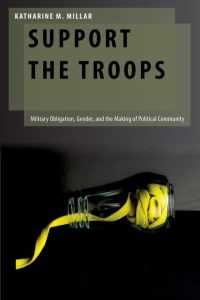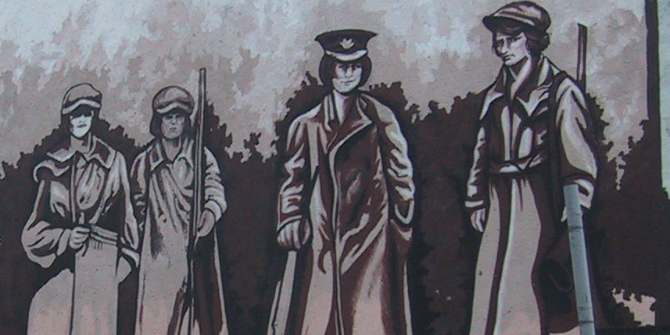In Support the Troops: Military Obligation, Gender, and the Making of Political Community, Katharine Millar analyses “support the troops” discourses in the US and UK during the early years of the global war on terror (2001-2010). Millar’s is a nuanced and powerful study of shifting civilian-military relations – and more broadly, of political community and belonging – in liberal democracies, writes Amy Gaeta.
Read an interview with Katharine Millar about the book published on LSE Review of Books in March 2023.
Support the Troops: Military Obligation, Gender, and the Making of Political Community. Katharine Millar. Oxford University Press. 2022.
 Katharine Millar’s Support the Troops identifies the emergence of calls to “support the troops” in the US and UK and asks what this discourse not only represents about political community and gender relations, but how this call mobilises public support for wars they may also oppose.
Katharine Millar’s Support the Troops identifies the emergence of calls to “support the troops” in the US and UK and asks what this discourse not only represents about political community and gender relations, but how this call mobilises public support for wars they may also oppose.
Millar contextualises “support the troops” within the normative construction of civilian-military relations in liberal democracies, and in doing so, challenges what she calls “the good story of liberalism” by tracing how liberalism has feigned moral superiority and structure by distancing itself from the military violence upon which it relies for maintenance (xx).
Millar contextualises ‘support the troops’ within the normative construction of civilian-military relations in liberal democracies, and in doing so, challenges what she calls ‘the good story of liberalism’
Across eight chapters, Millar assembles an impressive and varied archive of calls to support the troops, including speeches, media reports, government press releases, bumper stickers, adverts, and more. The book is guided by the feminist methodological impulse to confront uncertainty and partiality in our objects of study. In other words, it is refreshing that Millar admits this impressively researched book is guided by a series of unanswered questions that emerged in her personal experience of living in Canada during the Iraq War. These questions include, “can you oppose a war while still living in community” (x) and “why do we think we have to [support the troops]?” (xi). Also impressive is Millar’s choice to not focus on individuals’ reasons for why they do or do not support the troops. By focusing on the larger patterns in discourse, Support the Troops offers a more applicable and comparative work that enables readers to appreciate the slight, yet telling difference in US and UK civil-military relations and their formation.
Millar refuses easy equations and assumptions, namely the notion that “support the troops” is yet another site of militarism.
In this exploration, Millar refuses easy equations and assumptions, namely the notion that “support the troops” is yet another site of militarism. Rather than providing an answer, Millar instead demonstrates that militarism is simply not a productive analytical framing. Using the analytic of “discursive martiality,” she treats the military as a “discourse of gendered obligation and socially generative violence” and aims to follow how it moves and what it forecloses (35).
The idea that serving and thereby being willing to go to war and possibly die or become disabled for one’s country, is a key quality of what it meant to be a ‘good citizen,’ a deeply masculinised and racialised ideal.
Central to her investigation of support the troops discourse is the liberal military contract, a binding element of modern-day liberal democracies. Namely, the contract is the idea that serving and thereby being willing to go to war and possibly die or become disabled for one’s country, is a key quality of what it meant to be a “good citizen,” a deeply masculinised and racialised ideal. In earlier 20th-century wars, namely the World Wars, attacks on the domestic front, such as the aerial bombing of civilian areas in the UK, cultivated a shared sense of vulnerability among publics with the military and therefore obligation to sacrifice something in service of the war, Millar argues. As such, by World War Two, the expectation that everyone should do one’s part for the war – no matter the war – became domesticated, “experientially, affectively, and ideologically within the US and UK” (52). Structurally then, this further sedimented the feminisation of the domestic front – providing charity and care labour and making sacrifices at home – and the masculinisation of the war front – being willing to die to protect their nation and the feminised home front.
Particularly illuminating about Millar’s project is her tracing of how different wars produced different discursive formations of military personnel and therefore civilian-military relations. A memorable example is the refrain of “our boys” during the Vietnam War which framed soldiers as innocent, emphasising their youth and pre-empting how the experience of war would rush them into “manhood” (55). The innocent angle also firmly contrasts the horrors of the Vietnam War enacted by US soldiers.
The pluralised and more passive formation of the “troops” still requires the support of the public, posing important questions about what the troops need support for, and what support the military and government are failing to provide them that the public must supplement.
Once again, today, civilian-military relations are in flux for civilians living in liberal democracies. War is something that happens “over there,” and no longer do eager citizens enlist in hoards and go to war overseas, nor are they drafted, although military recruitment campaigns are still going strong. In tandem, many military service jobs appear as rather mundane, and this may impact the social importance and status of soldiers and soldiering to classed, racialised, and gendered ideas of civilised and ultimately “good” citizenship. Millar argues that these changes contribute to a shift in the gendered structure of the liberal military contract’s relationship to normalising violence. Whereas in past wars, where killing and dying for the state were key to masculinised normative citizenship, now “violence is presented as incidental to war, something that ‘happens’ to the vulnerable, structurally feminized troops” (102). The pluralised and more passive formation of the “troops” still requires the support of the public, posing important questions about what the troops need support for, and what support the military and government are failing to provide them that the public must supplement.
Millar’s text is extremely pertinent in a political era of cyberwar, drone warfare, and other forms of warfare that do not require the same degree of physical and geographical mobilising of troops.
Millar’s text is extremely pertinent in a political era of cyberwar, drone warfare, and other forms of warfare that do not require the same degree of physical and geographical mobilising of troops. As an academic working across questions of disability, gender, and contemporary US militarisation, I found Millar’s project to offer generative questions about how political community emerges differently when the ready-to-die cisgender-heterosexual-male idea of a solider and the violence inflicted by war is moved out of the view of the domestic front, especially when that figure is not even physically present in geographically defined spaces of conflict and war.
The book did leave me wanting a more robust analysis of the relationship between “good citizenship,” Whiteness, and masculinity, all of which are deeply shaped by the violence that underpins the “good” story of liberalism and civilian-military relations – although Millar certainly does not ignore or deny those connections. Yet, this may also be read as an opportunity for scholars to examine how changes in military service expectations and roles affect the ways that racial structures shift in accordance.
Millar’s investigation of the discursive patterns around “support the troops” begs questions about what happens when a minority or a wider segment of the public refuses to give such support.
Support the Troops is a powerful text that invites readers to think carefully about the present-day formation of political community and belonging in liberal democracies. Millar’s investigation of the discursive patterns around “support the troops” begs questions about what happens when a minority or a wider segment of the public refuses to give such support. As large waves of state-critical activism and civil protests continue to sweep across the US and UK, among other parts of the world, Support the Troops is a crucial touchpoint for understanding the “good story of liberalism” and the types of social contracts it relies upon for cohesion between the state, the military, and citizens.
This post gives the views of the author, and not the position of the LSE Review of Books blog, or of the London School of Economics and Political Science. The LSE RB blog may receive a small commission if you choose to make a purchase through the above Amazon affiliate link. This is entirely independent of the coverage of the book on LSE Review of Books.
Image Credit: CL Shebley on Shutterstock.






